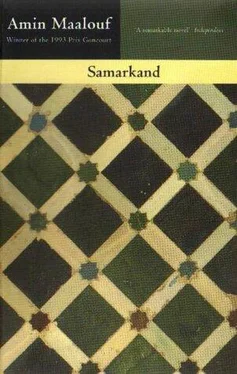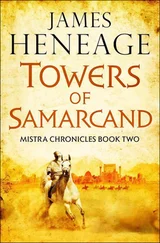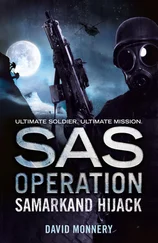‘Wake up! In quarter of an hour you be dead man!’
What Fazel informed me in a few broken phrases was the news which the whole world would know the next day by the magic of the telegraph.
The monarch had gone at mid-day to the Shah Abdul-Azim sanctuary for the Friday prayer. He was wearing the ceremonial suit he had had made up for his jubilee with gold threads, cornices of turquoise and emerald, and a feather cap. In the great hall of the sanctuary he chose his prayer space and a carpet was unrolled at his feet. Before kneeling down, his eyes sought out his wives and signalled them to stand behind him and he smoothed out his long tapering moustache which was white with bluish highlights, while the crowd of the faithful and the mullahs was pushing against the guards who were trying to contain them. Shouts were still coming from the outer courtyard. The royal wives came forward. A man had infiltrated amongst them, clothed in wool in the manner of a dervish. He was holding a sheet of paper in his outstretched arm. The Shah looked through his binoculars to read it. Suddenly there was a shot. A pistol had been hidden by the sheet of paper. The sovereign was hit right in the heart, but he still managed to murmur: ‘Hold me up,’ before he tottered and fell.
In the general tumult it was the grand vizir who was the first to gather his wits about him and shout: ‘It is nothing. It is a superficial wound!’ He had the hall evacuated and the Shah carried to the royal carriage. He fanned the cadaver on the back seat all the way to Teheran as if the Shah were still breathing. Meanwhile he had the crown prince summoned from Tabriz, where he was governor.
In the sanctuary the murderer was attacked by the Shah’s wives who insulted and thrashed him. The crowd ripped his clothing off him and he was about to be torn limb from limb when Colonel Kassakovsky, the commander of the Cossack brigade, intervened to save him — or rather to submit him to a first interrogation. Curiously the murder weapon had disappeared. It was said that a woman picked it up and hid it under her veil — she was never found. On the other hand, the sheet of paper which had been used to camouflage the pistol was retrieved.
Naturally Fazel spared me all those details. His account was terse:
‘That idiot Mirza Reza had killed the Shah. They found a letter from Jamaladin on him. Your name was written on it. Keep your Persian clothing, take your money and your passport. Nothing else. Run and take refuge in the American legation.’
My first thought was for the manuscript. Had Mirza Reza got it back that morning? In truth I was not yet aware of the gravity of my situation. An accomplice to the assassination of a head of state, I — who had come to the orient of poets! Nevertheless, appearances were against me. They were deceptive, misleading and absurd, but damning. What judge or commissar would not suspect me?
Fazel was watching from the balcony; suddenly he ducked and shouted out hoarsely:
‘The Cossacks are here. They are setting up roadblocks all around the hotel!’
We hurtled down the stairs. When we reached the foyer we took up a more dignified and less suspect pace. An officer with a blonde beard had just made his entrance, his hat pulled tight down and eyes that were sweeping all the room’s nooks and crannies. Fazel just had time to whisper to me: ‘To the legation!’ Then he separated from me and went over towards the officer. I heard him say ‘Palkovnik! Colonel!’ and saw him ceremoniously shake hands and exchange a few words of condolence. Kassakovsky had often dined with my friend’s father and that awarded me a few seconds of respite. I took advantage of it by speeding up my pace towards the exit, wrapped up in my aba , and turning into the garden which the Cossacks were busy turning into a fortified camp. They did not give me any trouble. As I was coming from inside the hotel they must have assumed that their commander had let me through. I went through the gate and headed towards the little alley to my right which lead to the boulevard des Ambassadeurs and in ten minutes to my legation.
Three soldiers were posted at the entrance to my alley. Would they let me through? To the left I could make out another alley. I thought it would be better to follow that one even if it meant having to come back later down the right alley. I walked on, avoiding looking in the direction of the soldiers. A few more steps and I would not be able to be see them any more, nor they me.
‘Stop!’
What should I do? Stop? With the very first question they asked me they would discover that I could hardly speak Persian, they would ask to see my papers and arrest me. Should I run off? They would not have much difficulty catching up with me, I would have been acting in a guilty fashion and would not even be able to plead in innocence. I had only a split second to make a choice.
I decided to carry on my way without hurrying, as if I had heard nothing. However there was a new commotion, the sound of rifles being loaded and footsteps. I did not give it a second thought but ran through the alleys without looking back and threw myself into the narrowest and darkest passageways. The sun had already set and in half an hour it would be pitch dark.
I was searching my memory for a prayer to recite, but could only manage to repeat: ‘God! God! God!’ in an insistent pleading, as if I had already died and was drumming on the gate of Paradise.
And the gate opened. The gate of Paradise. A little hidden gate in the mud-stained wall at the corner of the street. It opened. A hand touched mine and I grasped on to it. It pulled me towards it and shut the gate behind me. I kept my eyes shut out of fear. I was breathless with disbelief and happiness. Outside the procession went on and on.
Three pairs of laughing eyes were watching me — three women whose hair was covered but whose faces were unveiled and who were looking at me lovingly, as if I were a newborn babe. The oldest, in her forties, gave me a sign to follow her. At the end of the garden I had landed up in there was a small cabin where she seated me on a wicker chair, assuring me with a gesture that she would come to rescue me. She reassured me with a pout and with the magic word: andaroun , ‘inner house’. The soldier would not come to search where the women lived!
In fact the noise of the soldiers had come closer only to get more distant again, before fading away altogether. How could they have known into which of the alleys I had vanished? The district was a maze, made up of dozens of passages, hundreds of houses and gardens — and it was almost night.
After an hour I was brought some black tea, cigarettes were rolled for me and a conversation struck up. In slow Persian phrases with a few French words they explained to me to whom I owed my safety. The rumour had run through the district that an accomplice of the assassin was at the foreigner’s hotel. Seeing me flee they understood that I was the guilty hero and they had wanted to protect me. What were their reasons for this? Their husband and father had been executed fifteen years earlier, unjustly accused of belonging to a dissident sect, the babis , who advocated the abolition of polygamy, complete equality between men and women and the establishment of a democratic regime. Led by the Shah and the clergy, repression had been bloody and, aside from the scores of thousands of babis , many completely innocent people had also been massacred upon a simple denunciation by a neighbour. Then, left alone with two young girls, my benefactress had been waiting for the hour of revenge. The three women said that they were honoured that the heroic avenger had landed in their humble garden.
When one is viewed as a hero by women, does one really wish to disabuse them? I persuaded myself that it would be unseemly, even foolish, to disillusion them. In my difficult battle for survival, I needed these allies, I needed their enthusiasm and courage — and their unjustified admiration. I therefore took refuge in an enigmatic silence which, for them, lifted their last doubts.
Читать дальше












